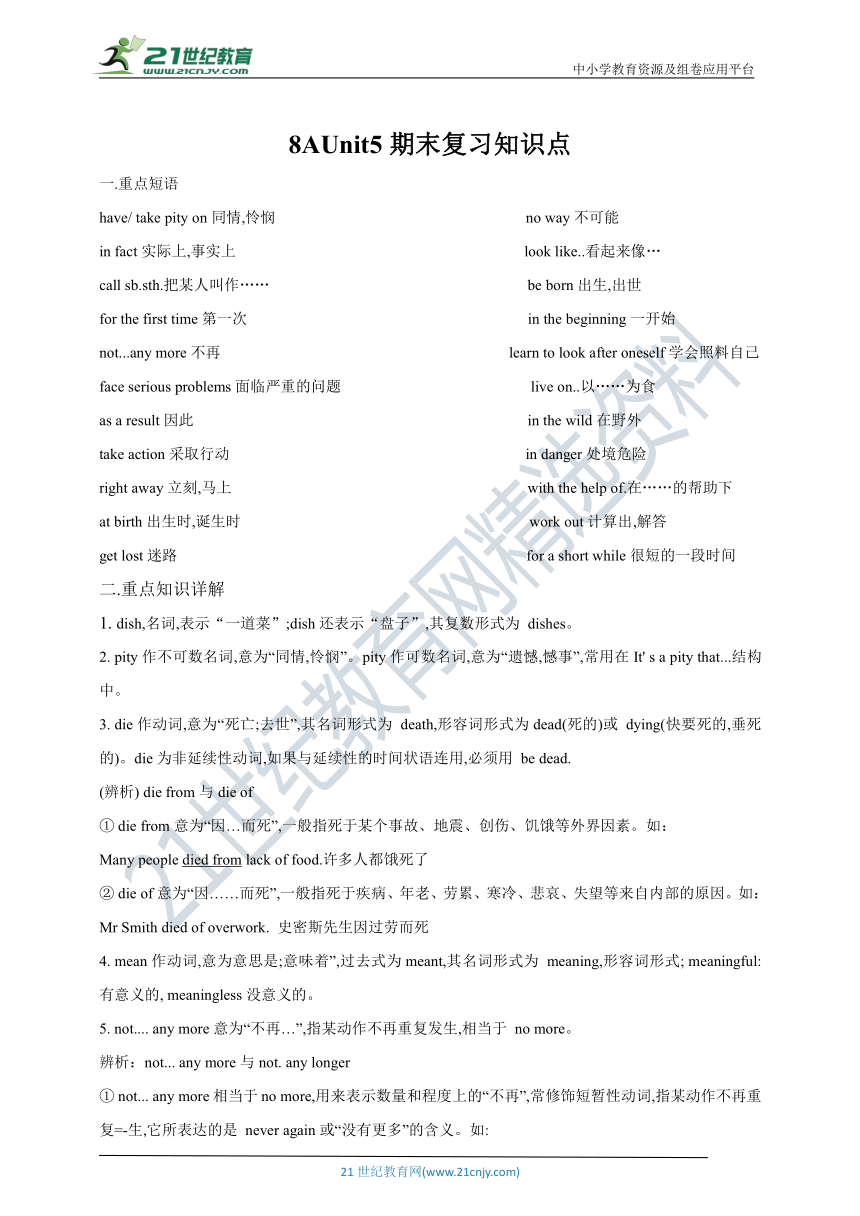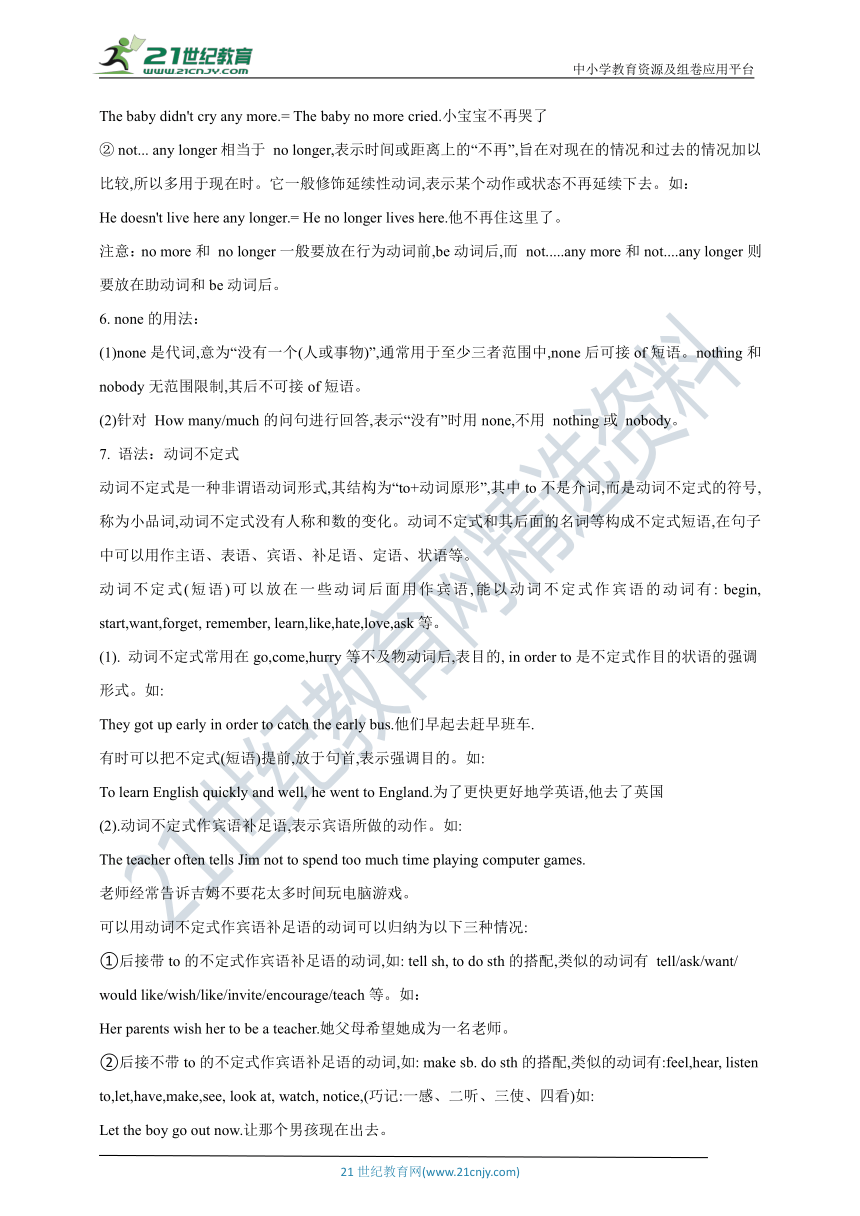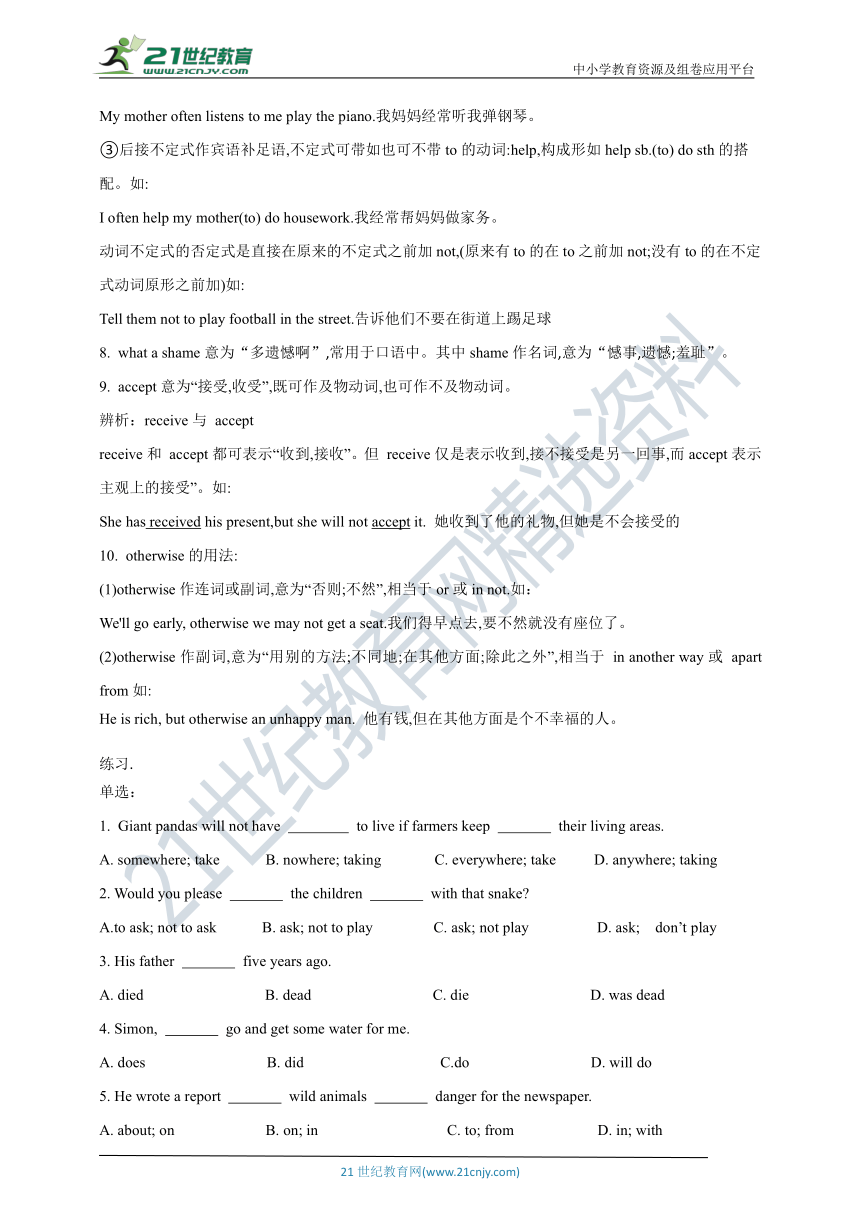Unit 6 Bird watching 期末复习学案 (重难点精讲+巩固练习+答案)
文档属性
| 名称 | Unit 6 Bird watching 期末复习学案 (重难点精讲+巩固练习+答案) |

|
|
| 格式 | zip | ||
| 文件大小 | 1.1MB | ||
| 资源类型 | 试卷 | ||
| 版本资源 | 牛津译林版 | ||
| 科目 | 英语 | ||
| 更新时间 | 2021-01-14 00:00:00 | ||
图片预览



文档简介
中小学教育资源及组卷应用平台
8AUnit5期末复习知识点
一.重点短语
have/
take
pity
on同情,怜悯
no
way不可能
in
fact实际上,事实上
look
like..看起来像…
call
sb.sth.把某人叫作……
be
born出生,出世
for
the
first
time第一次
in
the
beginning一开始
not...any
more不再
learn
to
look
after
oneself学会照料自己
face
serious
problems面临严重的问题
live
on..以……为食
as
a
result因此
in
the
wild在野外
take
action采取行动
in
danger处境危险
right
away立刻,马上
with
the
help
of.在……的帮助下
at
birth出生时,诞生时
work
out计算出,解答
get
lost迷路
for
a
short
while很短的一段时间
二.重点知识详解
1.
dish,名词,表示“一道菜”;dish还表示“盘子”,其复数形式为
dishes。
2.
pity作不可数名词,意为“同情,怜悯”。pity作可数名词,意为“遗憾,憾事”,常用在It'
s
a
pity
that...结构中。
3.
die作动词,意为“死亡;去世”,其名词形式为
death,形容词形式为dead(死的)或
dying(快要死的,垂死的)。die为非延续性动词,如果与延续性的时间状语连用,必须用
be
dead.
(辨析)
die
from与die
of
①
die
from意为“因…而死”,一般指死于某个事故、地震、创伤、饥饿等外界因素。如:
Many
people
died
from
lack
of
food.许多人都饿死了
②
die
of意为“因……而死”,一般指死于疾病、年老、劳累、寒冷、悲哀、失望等来自内部的原因。如:
Mr
Smith
died
of
overwork.
史密斯先生因过劳而死
4.
mean作动词,意为意思是;意味着”,过去式为meant,其名词形式为
meaning,形容词形式;
meaningful:有意义的,
meaningless没意义的。
5.
not....
any
more意为“不再…”,指某动作不再重复发生,相当于
no
more。
辨析:not...
any
more与not.
any
longer
①
not...
any
more相当于no
more,用来表示数量和程度上的“不再”,常修饰短暂性动词,指某动作不再重复=-生,它所表达的是
never
again或“没有更多”的含义。如:
The
baby
didn't
cry
any
more.=
The
baby
no
more
cried.小宝宝不再哭了
②
not...
any
longer相当于
no
longer,表示时间或距离上的“不再”,旨在对现在的情况和过去的情况加以比较,所以多用于现在时。它一般修饰延续性动词,表示某个动作或状态不再延续下去。如:
He
doesn't
live
here
any
longer.=
He
no
longer
lives
here.他不再住这里了。
注意:no
more和
no
longer一般要放在行为动词前,be动词后,而
not.....any
more和not....any
longer则要放在助动词和be动词后。
6.
none的用法:
(1)none是代词,意为“没有一个(人或事物)”,通常用于至少三者范围中,none后可接of短语。nothing和
nobody无范围限制,其后不可接of短语。
(2)针对
How
many/much的问句进行回答,表示“没有”时用none,不用
nothing或
nobody。
7.
语法:动词不定式
动词不定式是一种非谓语动词形式,其结构为“to+动词原形”,其中to不是介词,而是动词不定式的符号,称为小品词,动词不定式没有人称和数的变化。动词不定式和其后面的名词等构成不定式短语,在句子中可以用作主语、表语、宾语、补足语、定语、状语等。
动词不定式(短语)可以放在一些动词后面用作宾语,能以动词不定式作宾语的动词有:
begin,
start,want,forget,
remember,
learn,like,hate,love,ask等。
(1).
动词不定式常用在go,come,hurry等不及物动词后,表目的,
in
order
to是不定式作目的状语的强调形式。如:
They
got
up
early
in
order
to
catch
the
early
bus.他们早起去赶早班车.
有时可以把不定式(短语)提前,放于句首,表示强调目的。如:
To
learn
English
quickly
and
well,
he
went
to
England.为了更快更好地学英语,他去了英国
(2).动词不定式作宾语补足语,表示宾语所做的动作。如:
The
teacher
often
tells
Jim
not
to
spend
too
much
time
playing
computer
games.
老师经常告诉吉姆不要花太多时间玩电脑游戏。
可以用动词不定式作宾语补足语的动词可以归纳为以下三种情况:
①后接带to的不定式作宾语补足语的动词,如:
tell
sh,
to
do
sth的搭配,类似的动词有
tell/ask/want/
would
like/wish/like/invite/encourage/teach等。如:
Her
parents
wish
her
to
be
a
teacher.她父母希望她成为一名老师。
②后接不带to的不定式作宾语补足语的动词,如:
make
sb.
do
sth的搭配,类似的动词有:feel,hear,
listen
to,let,have,make,see,
look
at,
watch,
notice,(巧记:一感、二听、三使、四看)如:
Let
the
boy
go
out
now.让那个男孩现在出去。
My
mother
often
listens
to
me
play
the
piano.我妈妈经常听我弹钢琴。
③后接不定式作宾语补足语,不定式可带如也可不带to的动词:help,构成形如help
sb.(to)
do
sth的搭配。如:
I
often
help
my
mother(to)
do
housework.我经常帮妈妈做家务。
动词不定式的否定式是直接在原来的不定式之前加not,(原来有to的在to之前加not;没有to的在不定式动词原形之前加)如:
Tell
them
not
to
play
football
in
the
street.告诉他们不要在街道上踢足球
what
a
shame意为“多遗憾啊”,常用于口语中。其中shame作名词,意为“憾事,遗憾;羞耻”。
accept意为“接受,收受”,既可作及物动词,也可作不及物动词。
辨析:receive与
accept
receive和
accept都可表示“收到,接收”。但
receive仅是表示收到,接不接受是另一回事,而accept表示主观上的接受”。如:
She
has
received
his
present,but
she
will
not
accept
it.
她收到了他的礼物,但她是不会接受的
otherwise的用法:
(1)otherwise作连词或副词,意为“否则;不然”,相当于or或in
not.如:
We'll
go
early,
otherwise
we
may
not
get
a
seat.我们得早点去,要不然就没有座位了。
(2)otherwise作副词,意为“用别的方法;不同地;在其他方面;除此之外”,相当于
in
another
way或
apart
from如:
He
is
rich,
but
otherwise
an
unhappy
man.
他有钱,但在其他方面是个不幸福的人。
练习.
单选:
Giant
pandas
will
not
have
to
live
if
farmers
keep
their
living
areas.
A.
somewhere;
take
B.
nowhere;
taking
C.
everywhere;
take
D.
anywhere;
taking
2.
Would
you
please
the
children
with
that
snake?
A.to
ask;
not
to
ask
B.
ask;
not
to
play
C.
ask;
not
play
D.
ask;
don’t
play
3.
His
father
five
years
ago.
A.
died
B.
dead
C.
die
D.
was
dead
4.
Simon,
go
and
get
some
water
for
me.
A.
does
B.
did
C.do
D.
will
do
5.
He
wrote
a
report
wild
animals
danger
for
the
newspaper.
A.
about;
on
B.
on;
in
C.
to;
from
D.
in;
with
6.
—How
many
apples
are
there
in
your
bag?
—
.
No
B.
No
one
C.
Nothing
D.
None
—How
old
is
the
baby
boy?
—He
is
an
boy.
A.8
months
old
B.10
month
old
C.8-month-old
D.10-month-old
—I'm
worried
about
my
English.
—
harder,
you
will
catch
with
your
classmates!
A.
Working;
and
B.
To
work;
or
C.
Work;
and
D.
Worked;
or
9.
—I
think
he
be
in
the
classroom.
—No,
he
be
in
the
classroom.
I
saw
him
go
home
a
minute
ago.
A.
can;
may
not
B.
must;
may
not
C.
may;
can’t
D.
may;
mustn’t
10.
Some
wild
animals
are
in
danger
the
loss
of
living
areas.
A.as
B.
since
C.
because
of
D.
because
二.动词填空
Could
you
please
(not
play)
computers
games?
Why
(not
sing)
an
English
song?
No
one
is
willing
to
share
his
and
he
walked
away
(sad).
We
can
take
action
(protect)
the
pandas.
Don’t
smoke
in
the
reading
room,
will
you?
Sorry.
I
(not
do
it
)again.
(save)
more
money,
he
takes
the
underground
to
work.
We
are
writing
to
you
about
(protect)
wild
animals.
These
swim
suits
are
those
(swim).Please
take
care
of
them.
答案.一.
BBACB
DCCCC
二.1.not
play,2.not
sing,3.sadness;sadly.4.to
protect,5.won’t
do
it,6.to
save,7.protecting,8.swimmers’.
21世纪教育网
www.21cnjy.com
精品试卷·第
2
页
(共
2
页)
HYPERLINK
"http://21世纪教育网(www.21cnjy.com)
"
21世纪教育网(www.21cnjy.com)
8AUnit5期末复习知识点
一.重点短语
have/
take
pity
on同情,怜悯
no
way不可能
in
fact实际上,事实上
look
like..看起来像…
call
sb.sth.把某人叫作……
be
born出生,出世
for
the
first
time第一次
in
the
beginning一开始
not...any
more不再
learn
to
look
after
oneself学会照料自己
face
serious
problems面临严重的问题
live
on..以……为食
as
a
result因此
in
the
wild在野外
take
action采取行动
in
danger处境危险
right
away立刻,马上
with
the
help
of.在……的帮助下
at
birth出生时,诞生时
work
out计算出,解答
get
lost迷路
for
a
short
while很短的一段时间
二.重点知识详解
1.
dish,名词,表示“一道菜”;dish还表示“盘子”,其复数形式为
dishes。
2.
pity作不可数名词,意为“同情,怜悯”。pity作可数名词,意为“遗憾,憾事”,常用在It'
s
a
pity
that...结构中。
3.
die作动词,意为“死亡;去世”,其名词形式为
death,形容词形式为dead(死的)或
dying(快要死的,垂死的)。die为非延续性动词,如果与延续性的时间状语连用,必须用
be
dead.
(辨析)
die
from与die
of
①
die
from意为“因…而死”,一般指死于某个事故、地震、创伤、饥饿等外界因素。如:
Many
people
died
from
lack
of
food.许多人都饿死了
②
die
of意为“因……而死”,一般指死于疾病、年老、劳累、寒冷、悲哀、失望等来自内部的原因。如:
Mr
Smith
died
of
overwork.
史密斯先生因过劳而死
4.
mean作动词,意为意思是;意味着”,过去式为meant,其名词形式为
meaning,形容词形式;
meaningful:有意义的,
meaningless没意义的。
5.
not....
any
more意为“不再…”,指某动作不再重复发生,相当于
no
more。
辨析:not...
any
more与not.
any
longer
①
not...
any
more相当于no
more,用来表示数量和程度上的“不再”,常修饰短暂性动词,指某动作不再重复=-生,它所表达的是
never
again或“没有更多”的含义。如:
The
baby
didn't
cry
any
more.=
The
baby
no
more
cried.小宝宝不再哭了
②
not...
any
longer相当于
no
longer,表示时间或距离上的“不再”,旨在对现在的情况和过去的情况加以比较,所以多用于现在时。它一般修饰延续性动词,表示某个动作或状态不再延续下去。如:
He
doesn't
live
here
any
longer.=
He
no
longer
lives
here.他不再住这里了。
注意:no
more和
no
longer一般要放在行为动词前,be动词后,而
not.....any
more和not....any
longer则要放在助动词和be动词后。
6.
none的用法:
(1)none是代词,意为“没有一个(人或事物)”,通常用于至少三者范围中,none后可接of短语。nothing和
nobody无范围限制,其后不可接of短语。
(2)针对
How
many/much的问句进行回答,表示“没有”时用none,不用
nothing或
nobody。
7.
语法:动词不定式
动词不定式是一种非谓语动词形式,其结构为“to+动词原形”,其中to不是介词,而是动词不定式的符号,称为小品词,动词不定式没有人称和数的变化。动词不定式和其后面的名词等构成不定式短语,在句子中可以用作主语、表语、宾语、补足语、定语、状语等。
动词不定式(短语)可以放在一些动词后面用作宾语,能以动词不定式作宾语的动词有:
begin,
start,want,forget,
remember,
learn,like,hate,love,ask等。
(1).
动词不定式常用在go,come,hurry等不及物动词后,表目的,
in
order
to是不定式作目的状语的强调形式。如:
They
got
up
early
in
order
to
catch
the
early
bus.他们早起去赶早班车.
有时可以把不定式(短语)提前,放于句首,表示强调目的。如:
To
learn
English
quickly
and
well,
he
went
to
England.为了更快更好地学英语,他去了英国
(2).动词不定式作宾语补足语,表示宾语所做的动作。如:
The
teacher
often
tells
Jim
not
to
spend
too
much
time
playing
computer
games.
老师经常告诉吉姆不要花太多时间玩电脑游戏。
可以用动词不定式作宾语补足语的动词可以归纳为以下三种情况:
①后接带to的不定式作宾语补足语的动词,如:
tell
sh,
to
do
sth的搭配,类似的动词有
tell/ask/want/
would
like/wish/like/invite/encourage/teach等。如:
Her
parents
wish
her
to
be
a
teacher.她父母希望她成为一名老师。
②后接不带to的不定式作宾语补足语的动词,如:
make
sb.
do
sth的搭配,类似的动词有:feel,hear,
listen
to,let,have,make,see,
look
at,
watch,
notice,(巧记:一感、二听、三使、四看)如:
Let
the
boy
go
out
now.让那个男孩现在出去。
My
mother
often
listens
to
me
play
the
piano.我妈妈经常听我弹钢琴。
③后接不定式作宾语补足语,不定式可带如也可不带to的动词:help,构成形如help
sb.(to)
do
sth的搭配。如:
I
often
help
my
mother(to)
do
housework.我经常帮妈妈做家务。
动词不定式的否定式是直接在原来的不定式之前加not,(原来有to的在to之前加not;没有to的在不定式动词原形之前加)如:
Tell
them
not
to
play
football
in
the
street.告诉他们不要在街道上踢足球
what
a
shame意为“多遗憾啊”,常用于口语中。其中shame作名词,意为“憾事,遗憾;羞耻”。
accept意为“接受,收受”,既可作及物动词,也可作不及物动词。
辨析:receive与
accept
receive和
accept都可表示“收到,接收”。但
receive仅是表示收到,接不接受是另一回事,而accept表示主观上的接受”。如:
She
has
received
his
present,but
she
will
not
accept
it.
她收到了他的礼物,但她是不会接受的
otherwise的用法:
(1)otherwise作连词或副词,意为“否则;不然”,相当于or或in
not.如:
We'll
go
early,
otherwise
we
may
not
get
a
seat.我们得早点去,要不然就没有座位了。
(2)otherwise作副词,意为“用别的方法;不同地;在其他方面;除此之外”,相当于
in
another
way或
apart
from如:
He
is
rich,
but
otherwise
an
unhappy
man.
他有钱,但在其他方面是个不幸福的人。
练习.
单选:
Giant
pandas
will
not
have
to
live
if
farmers
keep
their
living
areas.
A.
somewhere;
take
B.
nowhere;
taking
C.
everywhere;
take
D.
anywhere;
taking
2.
Would
you
please
the
children
with
that
snake?
A.to
ask;
not
to
ask
B.
ask;
not
to
play
C.
ask;
not
play
D.
ask;
don’t
play
3.
His
father
five
years
ago.
A.
died
B.
dead
C.
die
D.
was
dead
4.
Simon,
go
and
get
some
water
for
me.
A.
does
B.
did
C.do
D.
will
do
5.
He
wrote
a
report
wild
animals
danger
for
the
newspaper.
A.
about;
on
B.
on;
in
C.
to;
from
D.
in;
with
6.
—How
many
apples
are
there
in
your
bag?
—
.
No
B.
No
one
C.
Nothing
D.
None
—How
old
is
the
baby
boy?
—He
is
an
boy.
A.8
months
old
B.10
month
old
C.8-month-old
D.10-month-old
—I'm
worried
about
my
English.
—
harder,
you
will
catch
with
your
classmates!
A.
Working;
and
B.
To
work;
or
C.
Work;
and
D.
Worked;
or
9.
—I
think
he
be
in
the
classroom.
—No,
he
be
in
the
classroom.
I
saw
him
go
home
a
minute
ago.
A.
can;
may
not
B.
must;
may
not
C.
may;
can’t
D.
may;
mustn’t
10.
Some
wild
animals
are
in
danger
the
loss
of
living
areas.
A.as
B.
since
C.
because
of
D.
because
二.动词填空
Could
you
please
(not
play)
computers
games?
Why
(not
sing)
an
English
song?
No
one
is
willing
to
share
his
and
he
walked
away
(sad).
We
can
take
action
(protect)
the
pandas.
Don’t
smoke
in
the
reading
room,
will
you?
Sorry.
I
(not
do
it
)again.
(save)
more
money,
he
takes
the
underground
to
work.
We
are
writing
to
you
about
(protect)
wild
animals.
These
swim
suits
are
those
(swim).Please
take
care
of
them.
答案.一.
BBACB
DCCCC
二.1.not
play,2.not
sing,3.sadness;sadly.4.to
protect,5.won’t
do
it,6.to
save,7.protecting,8.swimmers’.
21世纪教育网
www.21cnjy.com
精品试卷·第
2
页
(共
2
页)
HYPERLINK
"http://21世纪教育网(www.21cnjy.com)
"
21世纪教育网(www.21cnjy.com)
